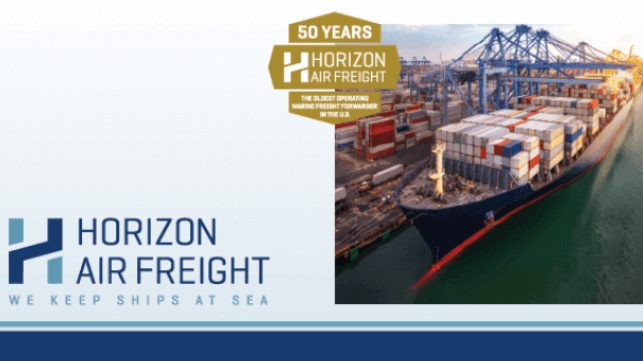Horizon Air Freight Epic Relationship with Marine Logistics Partner

True Heroes Do More Than Save the Day: How To Build an Epic Relationship with a Marine Logistics Partner
“During a shipping emergency, a freight forwarder frequently comes out looking like a real hero,” says Josh Roman, Chief Commercial Officer at Horizon Air Freight. “You put on your cape, move faster than a speeding bullet, leap over a few tall obstacles, and do what it takes to save the day.”
When such predicaments arise (and are then solved), the victories may be temporarily gratifying, but they can get expensive, to say the least. While a successful relationship with a marine logistics partner should certainly include the ability to handle emergencies, there’s so much more upon which a sustainable partnership is based.
“What happens every day, from the first mile to the last mile, is where the value is delivered,” Roman explains. “Consider what’s being lost long-term when you’re jumping from crisis to crisis with different freight forwarders. Or even sticking with the same one in a never-ending cycle of barely averted catastrophe, with no time to focus on sustainable success.”
When crucial minutes and tens or even hundreds of thousands of dollars are on the line, you need someone who anticipates every detail and ensures it’s buttoned up before it becomes an emergency — no matter where you’re shipping, what you’re shipping, or how it has to get there. You need a stable partner who knows not only your company, but the complexities of each shipment, the landscape of where it’s going, and the intricacies of getting it there quickly, safely, and cost-effectively.
“To gain all of the benefits long-term,” Roman insists, “Superman emergencies can’t be the only basis of your partnership. You need someone who can be your Clark Kent, too.”
So how do you cultivate a heroic relationship with a freight-forwarding partner, beyond the thrill of crisis? In very similar ways, you would for any fulfilling, long-term partnership.
Know Yourself and What You Need
To save yourself time, money, and potential heartache, first, you need to know what you’re looking for. Carve out time to consider all your logistics needs, including locations, quality control, cost efficiencies, and even cultural or bureaucratic demands. Examine the full value a partner could provide in each department, beyond the shiny facet that seems to be demanding attention now.
Once you’ve looked closely at the ways in which a forwarder could add value to your company, set these expectations for yourself and evaluate your potential suitors to see what they can offer. Clearly understanding what you need most, and what they can give, will shape your entire partnership.
Communicate with Clarity — and Frequency
When you’ve defined what you’re looking for, communicate that clearly, and often. This includes what you’re seeking in the first interaction together.
“When you’re going out with someone,” Roman illustrates, “do you just say, ‘I’ll pick you up at 7:00,’ and go? Or is it better to define what you’ll both be doing? ‘Meet for coffee’ for example, is a lot different than ‘take in the symphony,’ or ‘split the bill at this Michelin restaurant.’” Defining how you will make your first interaction will set the table for you both, and will help your new logistics partner understand exactly how they can help you.
Then, during this initial “date” conversation (and even while setting it up), communicate clearly what will work best for you and your company long-term. Make sure your new partner agrees to and can fulfill these expectations. “Failure to communicate is often a failure,” Roman asserts. “Even and especially from the beginning.”
Remember too that good communication goes both ways. Be ready to share — and receive — feedback along the way. Plan for regular check-ins, not just during the first interaction but throughout your contract together. During these appointments, discuss not only where you succeeded and where improvements can be made, but key upcoming items including new company priorities, global trends, or staff changes.
The more you and your marine logistics partner can communicate with mutual honesty and respect, the longer-lasting the rewards of your partnership will be.
It’s Okay to Go Slow
Not ready for a full-scale commitment just yet? Find a partner who can meet a subset of your requests before going all-in. “At Horizon, we can handle shipments in say Japan or Europe first,” Roman recommends, “and then expand to another area, and another, until we’re handling all your shipments globally.”
By taking a phased approach, you can achieve good things in one area while working out any kinks. With continued communication along the way, before long you’ll be ready to conquer the world.
If you’re interested in starting a new relationship or expanding your current one with Horizon, contact us today to set up a conversation. We’ll take the time to learn the intricacies of what you need — and make recommendations based on what we hear from you — to guarantee your critical marine spares, supplies, and equipment are delivered from any vendor worldwide, wherever you need it, whenever you need it, on time and on budget.
The products and services herein described in this press release are not endorsed by The Maritime Executive.

